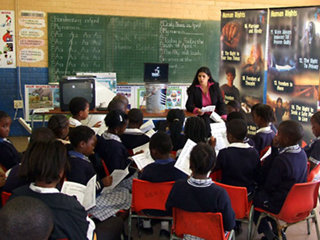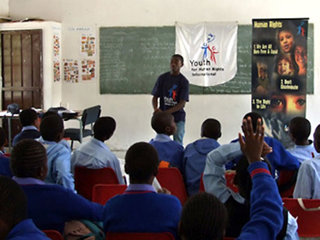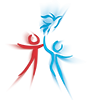Youth for Human Rights in South Africa
 South African students study Youth for Human Rights materials in class
South African students study Youth for Human Rights materials in class
Millions of South Africans have learned about their human rights through the work of Youth for Human Rights South Africa. The 30 Rights, 30 Ads have aired on big-screen televisions in all international airports in South Africa, in major shopping centers and government offices, and on the big screens in movie houses.
Youth for Human Rights South Africa has worked with many schools to teach the United Nations Universal Declaration of Human Rights and in at least one such school the students recite their 30 human rights every morning before class.
The National Department of Education's office on Human Rights and Values Education provided a platform for Youth for Human Rights to be showcased to representatives from all nine provinces in South Africa.
This afforded them the opportunity to find out about the Youth for Human Rights curriculum and to adopt it as a campaign for their provinces. The Department has acknowledged that hosting workshops for educators and students is of great importance.
Youth for Human Rights volunteers in South Africa have energized arts groups, with emphasis on making human rights education a fun activity for children.
At an event organized at the Gauteng Province Legislature during the Youth for Human Rights International World Tour 2009, a troupe of young gumboot dancers and a local drama group performed.
 Students in South Africa participate in a Youth for Human Rights workshop on human rights.
Students in South Africa participate in a Youth for Human Rights workshop on human rights.
Through Youth for Human Rights South Africa's programs, children in rural Bushbuckridge who previously had no understanding or awareness of human rights were given human rights education for the first time. Without this education a number of young girls had become victims of abuse. With education, however, one for one they realized that their rights were being abused. As a result, they were able to speak up and alert the adults to the fact that they were on the brink of sexual abuse.
In Kwa Zulu Natal, a chronic bullying problem seemed to have no solution at a school where students were regularly the victims of abuse and violence. After group discussions and lessons on human rights, including the full run of Youth for Human Rights’ 30 public service announcements, students and educators alike deciding to deal with the problem of bullying and violence in their school.
Students came forward with apologies and regrets about their behavior, pledging their part to keep the school safe and make violence and bullying a thing of the past.
Following a workshop introducing the Youth for Human Rights educational materials, one educator said, "Thank you so much for a wonderful workshop. This workshop showed me that human rights are the core on which we need to depend for survival. Our survival is the most important aspect that we have. The [Youth for Human Rights] DVD is an important part because it makes us see that it is not just us who can be hurt, but that it happens all over the world."
Another educator wrote, "...I thought I was doing the best that I could when presenting the lesson on human rights, only to find out that I did not have enough information on the topic. I am very grateful for the materials I have received. My eyes and mind are more opened now."
Youth for Human Rights public service announcements have aired on national channel E-TV and on Soweto TV for more than two years. Then the Youth for Human Rights message gained an even broader diversity. YHRI’s educational materials were also unveiled to 250 million viewers of Good Morning Africa. The program broadcasts continent-wide to 54 African countries via DSTV, and into Asia, Europe and the rest of the world via the Internet.
Midrand FM, Lotus FM, East Wave FM, Radio Islam International, East Coast Radio, SA FM, Radio Hindvani, Ukhozi FM, Radio Today and many community radio stations have hosted Youth for Human Rights spokespeople and aired radio public service announcements on a regular basis.
Take 5, a South African television talk show, was prompted to take on its own human rights education initiative by hosting a panel discussion that featured Youth for Human Rights South Africa representatives. They spoke about the importance of human rights and why it is vital to educate youth about their human rights.
Following the panel discussion these young panelists toured Soweto replicating the awareness-raising deeds of the young boy in the Human Right #29 public service announcement: knocking on doors and reading people their rights.
